Vessels - Available - Fotogalerie - Photo gallery
Image database with photographs of ancient art and antiquities
Our image database provides photographs of ancient art and antiquities for press releases as well as for private use. All artefacts sold in our gallery are documented through professional photographs. The resulting image library contains numerous ancient Egyptian, Greek and Roman antiquities as well as ancient coins. The time span from Stone Age, over Bronze Age and Classical Antiquity until Late Antiquity is covered.The photo gallery aims at providing a vast visual archive equipped with filters and search tools. You are most welcome to search the constantly growing number of artefacts in the image library. We are also happy to authorize hyperlinks from your webpage / forum to the objects depicted in our gallery. For this purpose, please send us a short notification prior to placing a hyperlink. For almost every object high definition photographs are available and can be provided e.g. to document your collection or for scientific papers or popular science articles. If you are interested in using pictures for publications, print media or other purposes, please contact us and we will be happy to assist you.
-
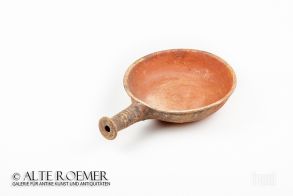 Rare Apulian terracotta patera
Rare Apulian terracotta pateraFrom an old Swiss collection, btw 1986 and 2001 on loan at the archeologic collection of the University of Zürich.
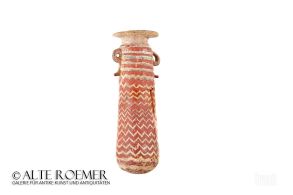 Core-formed glass alabastron
Core-formed glass alabastronColourful example from the beginning of glass manufacturing in ancient Greece. Glass vessels like this were manufactured on the island of Rhodos during the 5th century BC.
 Alabastron from colourful core-formed glass
Alabastron from colourful core-formed glassColourful example from the beginning of glass manufacturing in ancient Greece. Glass vessels like this were manufactured on the island of Rhodos during the 5th and 4th century BC.
 Core-formed glass juglet
Core-formed glass jugletThe brown glass with a decorative wave pattern imitates the shape of a Greek metal or pottery hydria, but without the handles at the sides. A nice example for the early glass production in Greek to Hellenistic times.
 Hoard from the Late Bronze Age
Hoard from the Late Bronze AgeComplete surviving hoard consisting of one bronze bowl, two belts and twelve bracelets. Urnfield culture HaB1. The amazingly well preserved group is excessively rare on the art market as well as in museum collections.
 Large Roman cinerary urn
Large Roman cinerary urnImpressive jar from the 1st or 2nd century AD. Great condition for ancient glass of this size. 26cm high.
 Mycenaean stirrup jar
Mycenaean stirrup jarCharacteristic type of vessel for the Mycenaean civilization in Bronze Age Greece. From the peak of Mycenaean pottery production in the 14th century BC. From the inventory of an old educational lending collection.
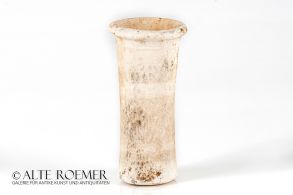 Egyptian stone beaker
Egyptian stone beakerThe elegant stone vase was probably used as an ointment vessel. 3rd dynasty of ancient Egypt, Old Kingdom.
 Egyptian Kohl vessel
Egyptian Kohl vesselThe small stone pot was used for Kohl, the eye cosmetic of the ancient Egyptians. Black remains of the substance are still preserved on the inside. From the time between Middle Kingdom and New Kingdom.
 Egyptian Kohl vessel
Egyptian Kohl vesselThe small stone pot was used for Kohl, the eye cosmetic of the ancient Egyptians. From the time between Middle Kingdom and New Kingdom.
 Small Egyptian Kohl vessel
Small Egyptian Kohl vesselThe stone pot was used for Kohl, the eye cosmetic of the ancient Egyptians. Nicely polished stone surface. From the 2nd Millenium BC.
 Egyptian Kohl vessel
Egyptian Kohl vesselThe massive stone cosmetic pot was used for Kohl, the eye cosmetic of the ancient Egyptians. From the time between Middle Kingdom and New Kingdom.
 Kohl vessel from the New Kingdom
Kohl vessel from the New KingdomA fantastic goblet shaped vessel from the 18th dynasty of ancient Egypt. Made of finely polished Egyptian alabaster.
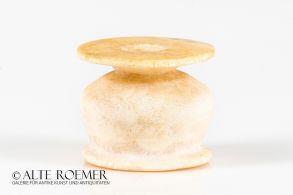 Egyptian Kohl vessel
Egyptian Kohl vesselThe small stone container was used for Kohl, the eye cosmetic of the ancient Egyptians. Black remains of the substance are still preserved on the inside. From the time between Middle Kingdom and New Kingdom.
 Conical Old Kingdom stone vessel
Conical Old Kingdom stone vesselThe elegant stone vase is made of wonderful banded alabaster. 5th to 6th dynasty, Old Kingdom.
 Large greek alabaster Alabastron
Large greek alabaster AlabastronProbably Cypriot. Very large, impressive vessel in excellent condition. From the Swiss collection W. Rosenbaum (1894 - 1984).
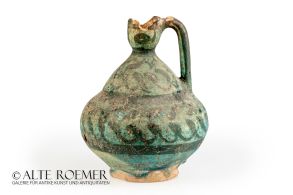 Persian jug from Sultanabad
Persian jug from SultanabadImpressive pottery with turquoise glaze and black paint. From 13th century Iran. With a letter from the Royal Victoria and Albert Museum.
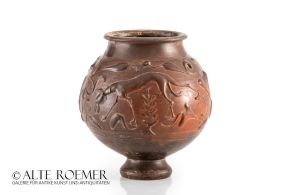 Very rare large Samian Ware hunt cup
Very rare large Samian Ware hunt cupThe barbotine decoration is masterly made and excellently preserved. Absolutely worth the exhibition in a museum. A similar piece is on exhibition in the British Museum in London. Ex Vienna Schönbrunn Gallery, acquired 1986. With TL analysis.
 Greek fish plate from Newark Museum
Greek fish plate from Newark MuseumAthenian or Greek colony in Southern Italy. Almost perfectly preserved, intense patina. Since 1954 in the collection of the Newark Museum of Art, USA.
 Roman glass juglet with trailing
Roman glass juglet with trailingThe elegant vessel is a magnificent example of the mature art of glass making in the Roman Empire during Late Antiquity. From the collection of the well-known archaeologist Professor Fritz Fremersdorf.
 Core-formed polychrome glass alabastron
Core-formed polychrome glass alabastronNice and small vessel with a strong patina. It is not a classical type of alabastron and retains a few mysteries.
 Mesopotamian libation bowl
Mesopotamian libation bowlAlabaster vessel with ram's head as a spout for the offering. A perfectly preserved piece from the 3rd Millennium BC.
 Predynastic beaker with black top
Predynastic beaker with black topA perfect example of the highly distinctive black-topped ware from the Naqada I and II culture. The tall jar is impressively well preserved.
 Corinthian aryballos in the form of a ram
Corinthian aryballos in the form of a ramBeautiful small vessel for perfumed oil from the heyday of Corinthian pottery production, at the beginning of the 6th century BC.
 Mochica stirrup vessel of a dignitary
Mochica stirrup vessel of a dignitaryImposing Peruvian vessel shaped like a man with cloak in his hands. Circa 100 to 500 AD. Exhibited multiple times and published.
 Islamic glass flask
Islamic glass flaskSlender glass flask from the Golden Age of Islam. With a nicely shaped handle and a wonderful, subtle patina. Ex-Sotheby's.
 Mochica stirrup vessel in falcon shape
Mochica stirrup vessel in falcon shapeSmall vessel from the golden age of the Moche culture. It is shaped like a falcon with painted on details. Including certificate from 1984.
 Islamic glass flask
Islamic glass flaskBulbous flask from the Golden Age of Islam. Made of beautiful reddish brown glass. Ex-Sotheby's.
 Stirrup vessel in squash shape
Stirrup vessel in squash shapeGreat example of the intricately designed vessels of the Peruvian Chimú culture, decorated with a monkey and birds. The squash was an important fruit in the pre-Columbian Kingdom of Chimor.
 Corinthian aryballos in the form of a hare
Corinthian aryballos in the form of a hareBeautiful small vessel for perfumed oil from the heyday of Corinthian pottery production, made around 600 BC.
 Roman glass bottle with beautiful colour bands
Roman glass bottle with beautiful colour bandsA colourful ancient glass from the early 1st century. Made in the Eastern Mediterranean.
 Glass double unguentarium
Glass double unguentariumImpressive cosmetic vessel with large handle and nice spiral trailing decoration. A Palestinian type from the Late Roman or Early Byzantine period.
 Mochica stirrup vessel as a monkey
Mochica stirrup vessel as a monkeyDistinctive vessel in the shape of a monkey. Typical Peruvian flask made circa 100 to 500 AD. With documents form the 1980ies.
 Stirrup vessel in the shape of cacao fruits
Stirrup vessel in the shape of cacao fruitsPlastically shaped vessel from the Peruvian Chimú culture. It embodies an important agricultural product of the pre-Columbian civilization of Chimor. With TL report from 1979. Part of a special exhibition from 2024 to 2025.
 Cycladic marble vase
Cycladic marble vaseThe so-called Kandila perfectly illustrates why the abstract Bronze Age art of the Cyclades still fascinates us today. The parallels to modern art are unmistakable. The masterpiece comes from Elie Borowski's inventory.
 Sasanian gilt silver bowl
Sasanian gilt silver bowlVery nice piece of art from Late Antiquity. Decorated by a relief and a partial gilt. Ex Sotheby's.

